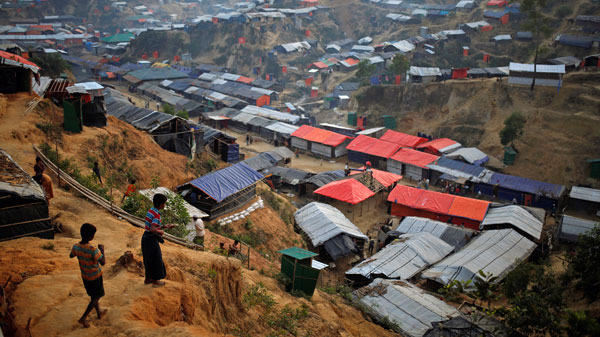News & Updates
DFID steps up support for Rohingya refugees as monsoon season looms
20 March 2018

The UK’s Department for International Development (DFID) has increased support to Rohingya refugees ahead of monsoon season.
Bangladesh’s annual cyclone and monsoon season is fast approaching which poses significant threats to the refugee community living in Cox’s Bazar, Bangladesh.
Estimates suggest that almost 1 million people have fled from neighbouring Myanmar following persecution.
A large number of these refugees are living in an overcrowded and hilly settlement that are extremely vulnerable to flooding and landslides.
The UN estimates that 102,000 of the refugees are living in areas that are at risk from flooding and 12,000 are at risk from landslides.
UK aid have provided reinforced shelter and sandbags to 158,000 people to protect them from winds and flood water. Throughout Cox’s Bazar paths are also being reinforced to protect against landslides.
The increase in aid comes just a few days after the UN launched an appeal for $951 million to support Rohingya refugees and their host families.
International Development Secretary, Penny Mordaunt said:
“With the cyclone and monsoon season in Bangladesh imminent it is time to firmly focus our efforts on Cox’s Bazar where nearly a million persecuted and displaced Rohingya people now live”
“The Rohingya people have suffered so much already and now they are living in constant fear of the imminent floods causing utter devastation and destruction”
Plans to support the aftermath of the predicted floods and landslides are also being increased.
Flooding also brings the risk of waterborne diseases such as cholera. UK aid is also ensuring that over 250,000 people will have access to safe drinking water throughout the rainy season.
UK aid is supporting vaccination campaigns against cholera, measles, diphtheria in preparation for monsoon season.
To date, almost 400,000 children have been vaccinated with a further 400,000 vaccinations planned.
Furthermore, approximately 5,000 new latrines have been constructed and strategically placed throughout the camps, while plans to move more a further 6,700 to safe grounds have already begun.
Penny Mordaunt added:
“Our swift response can save lives. Right now UK aid is strengthening roads and pathways to ensure vital medication and food can reach the very centre of the camps. UK aid is also reinforcing shelters to protect vulnerable families at risk of flood water and landslides”
If you’d like to stay informed on the latest updates in aid and development, please sign up for the AIDF newsletter.
Image credit: Reuters